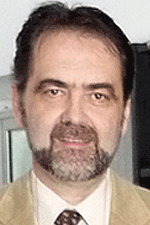> [Archived] Interviews

Interview with Mihai Constantinescu, the Director of Artexim
Mr.
Constantinescu, the announcement on the progress of the George
Enescu International Competition was released this year in
September. Which are, in your opinion, the advantages and
disadvantages of the displacement of the competition towards the
festival?
I would rather talk only about the advantages, as the competition represents a value at the moment. It is an event which can only be perceived as a competition, but do you remember that it was connected to several concerts and the audience couldn’t decide where to go? At this moment all the concerts roll on either at the National University of Music or at the Athenaeum, and the audience will be able to attend all these concerts which are going to take place over a period of time of twenty-one days. This is a great advantage both for the competitors and the audience who want to see young people willing to assert themselves. We are trying to carry further the advertising and the connecting of this event to the festival due to the festival’s impact, because we are talking about Enescu, and it is compulsory to play many compostions by Enescu in each section of the competition.
Coul
you possibly tell us something about the next edition’s sections,
awards and changes for this competition up against its former
edition?
The stages of the competition are going to be staggered, meaning that there are only a few days when two sections are being developed at the same time. We tried to separate these sections and organise them independently, to break them up so that the audience may see as many competitors and performances as possible. We start with the violin competition on 9th, followed by the cello competition on 12th and the piano competition on 17th September. The finals will be performed only with the George Enescu Philharmonic, the most important orchestra in Bucharest and this represents a big achievement for the competition. The semifinal recital and the finale will take place at the Romanian Athenaeum; and this is another cornerstone achieved by this competition. Speaking about the awards, they are the same as they have been so far for the three sections and for the composition section, as well. Regarding the jury, it is the one announced in 2013, with minor changes; two or three jury members won’t be able to come this year, so they were replaced by musician academics of the same value.
What’s
your opinion on the starting-up chances of the George
Enescu Competition winners on the Romanian stages and
abroad?
It largely depends on the qualitative level of the singers and also on the jury’s decision. Some of the last editions’ winners already perform in remarkable international performances. We hope that they will be invited so they could sing on the Romanian stages, as well. I have to criticize the orchestras because there are only a few in the country which allow the George Enescu Competition laureates to perform on their stages alongside orchestras or during recitals. They either don’t afford or don’t want to do it. We award prizes to the George Enescu Competition winners by giving them the opportunity to perform in Bucharest, but this is possible only if demanded by the orchestra. As regards these winners’ participation in the festival, as we have anticipated, we will decide whether they will perform along with great piano and cello international players according to their training, because the requirements are high; having the opportunity to play along with such artists is a great thing and equally a challenge which we offer to the winners of these sections.
Translated by Anca-Elena Băluț and Elena Daniela Radu
MTTLC, The University of Bucharest














